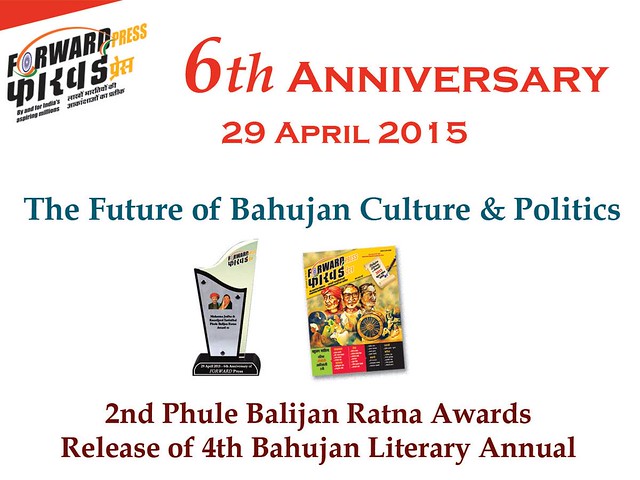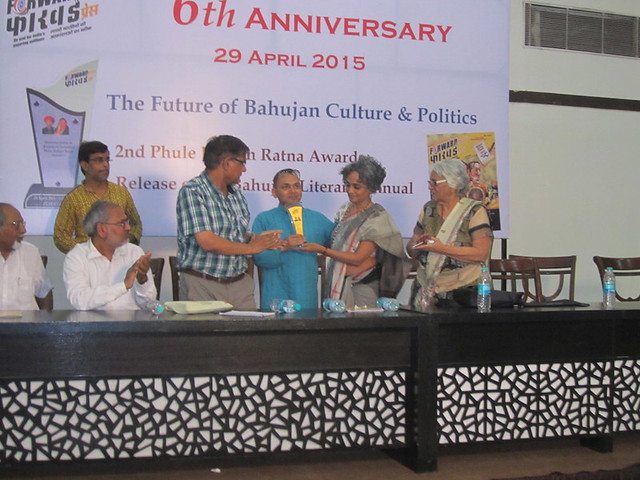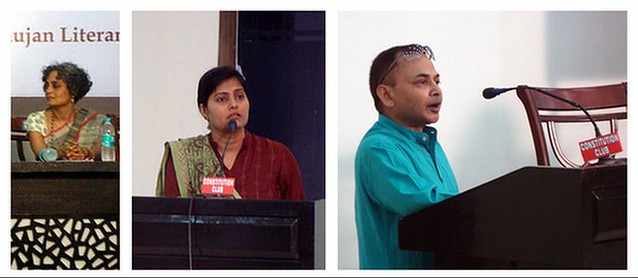By TwoCircles.net Staff Reporter,
New Delhi: “Your identity – as a dalit, as ST or OBC – is imposed on you. You fight that and then you get locked in it. This is what they want. They want the dalits, Muslims, Christians, tribals etc to fight. The upper caste hegemony is a ‘demonically clever system of administration’ wherein the conflict is not from top to bottom, but the fight is at the bottom with each other,” said author Arundhati Roy on Wednesday.
Caste ridden society is worse than apartheid, worse than slavery, she said as she trashed the idea of continued reservation as identity imposed on the dalits and other castes.

This society is a complex system, the “demonically clever” system, based on caste and we have to look at literature as a means to look at this complexity, Roy said after unveiling the special issue ‘Bahujan Literary Annual 2015’ of Forward Press, Hindi-English bilingual monthly magazine, on its 6th anniversary.
The event was held at Constitution Club of India here on the theme ‘The Future of Bahujan Politics and Literature’. The occasion was graced by eminent personalities such as Anupriya Patel, Ramdas Athawale, Ali Anwar, Ramnika Gupta, Braj Ranjan Mani, Sheoraj Singh Bechain, Jaiprakash Kardam and Arvind Jain.
Without naming anybody, Roy said there are some people out there who are posturing as OBC but they are not, they are baniya and they are trying to create a situation based on Hindu and not Hindu religion. “So we need to know, who are our friends and who are our enemy,” she said.
Ramdas Athawale and Anwar, both Rajya Sabha MPs, spoke for short durations before rushing back to attend ongoing Parliament session and a TV debate respectively. Stating the percentage wise population of SCs, STs, OBCs, Muslims and Christians, Athawale said Bahujan population is huge. “(But) who get Bahujan support come to power. But nobody supports Bahujans,” he said and exhorted the entire Bahujan fraternity to be united, leaving behind clashes between dalits and OBCs etc.

Author Arundhati Roy (third from right) among others at the release of special issue of ‘Bahujan Literary Annual 2015’ at the 6th anniversary event of Forward Press magazine in New Delhi on April 29, 2015.
Education is the only solution to go ahead, he reminded the gathering; spoke about the difference between dalit movement in Maharashtra and other parts and ended his small talk on a political note as he said that his party is now-a-days favouring the idea of offering reservation on the basis of economic condition, which can also be applicable to higher caste poor families too.
After expressing surprise at Athawale’s suggestion, Ali Anwar, his RS counterpart, countered with as he said: “I think we are not ready for it. Reservation by default has to be for socially backward or educationally backward. This is necessarily based on the caste,” he said and cited the example of Prophet Mohammad’s idea of Fitra – Zakaat which is not applicable to Syeds, poor or rich.
Ali also emphasized that he (his organization) has tried to break the myth that Muslims are a monolith society. “At the All India Pasmanda Muslim Mahaz, we say Pasmanda Muslim and not Muslim Pasmanda. We are Pasmandas first, the original dwellers of this land, and then Muslims. It is only now that people like us have started admitting – willingly or grudgingly – that he/she is a Pasmanda.”

Braj Ranjan Mani, author of ‘De-Brahmanising History’ delivering the key note address at the 6th anniversary event of Forward Press magazine in New Delhi on April 29, 2015.
A hardcover fresh edition of a 2006 book ‘De-brahmanising History’ by Braj Ranjan Mani was again released at the occasion. Ivan Kostka, Forward Press managing editor said the book was the thought behind starting Forward Press, the book had become the manual. ‘Started in May 2009 calling itself as ‘by and for India’s aspiring millions’, Forward Press claims that it remains “committed to the Bahujans – our issues and interests – providing both information and inspiration for those labelled ‘backward’ to aspire and to actually move forward, even upward, to soar’.
Delivering key note address on the topic ‘The Future of Bahujan Politics and Literature’, Mani said there is no real Bahujan leader. “They are a huge part of the problem. Their empty struggle against caste is thoroughly exposed. We need rigorous fundamentals of Phule and Ambedkar.”
There are three new isms in the – cultural monoism, propagated by upper caste minds; second is around Hinduism, India is Hindu, always been Hindu since time immemorial and third is cultural pluralism by Congress as manifest by beautiful phrase of ‘unity in diversity’.

Sujata Parmita, literary commentator; Arvind Jain; Anupriya Patel, rights activist; Jaiprakash Kardam, poet, novelist; Ramanika Gupta, editor of ‘Yudhdharat Aam Aadmi’ also spoke on the occasion. Jain pointed out with “disagreement” the contradiction as to how “we” have supported those who have oppressed “us” for power.
Patel said, till the time Bahujans are kept away from their rights, scope of Bahujan politics will continue to exist. Even when most political parties end up appointing dalits or OBCs for symbolic representation, she said, that is a good first step. “Symbolic representation is the first step and the second step is of transformation (for which) take charge, be part of the system. Education alone is the potent weapon for it.”
Lauding the Forward Press for keeping up the effort despite heavy odds, Sheoraj Singh ‘Bechain’, DU Professor, started with recalling a conversation that he had with BSP leader Kanshiram shortly before he anointed Mayawati as chief minister. “Instead of eyeing power, you should start a magazine for its social, cultural and intellectual power that will bring real empowerment of Bahujans,” Bechain had advised Kanshiram.
He also narrated an anecdote from Babasaheb Ambedkar’s life. Shahu Maharaj, the then royal from Kolhapur in Maharashtra had in 1902 initiated reservation based on caste and donated Rs 2500 for a newspaper. “Ambedkar requested (Lokmanya) Tilak to publish the ad for ‘Mooknayak’ as a social cause when his request was declined. Then Ambedkar offered to pay money for it even then the ad was not published. That was when Ambedkar said, ‘we need to do things on our own, we will need to run our own paper’,” Singh said, adding, “The power of a newspaper, the press, is the real power, more than that of a minister.”

Arundhati Roy, Anupriya Patel & Braj Ranjan Mani
“And what do we do? We keep on fighting amongst us. We try to enter politics and ‘shine’ as early as possible. The real power does not lie in politics but in social power. We need to sharpen our intellect for the same,” he asserted.
At the end of almost three hour long function, the second Mahatma Jyotiba and Krantijyoti Savitribai Phule Balijan Ratna awards were presented to Brah Ranjan Mani, A R Akela (poet, folk singer, author and publisher) and Dr Hiralal Alawa (senior resident doctor at AIIMS and founder of Jai Adiwasi Yuwa Shakti).
After accepting the award, Akela lamented that not a single speaker remembered Kanshiram (for his contribution) at the event on the topic of ‘Bahujan Culture and Politics’.

